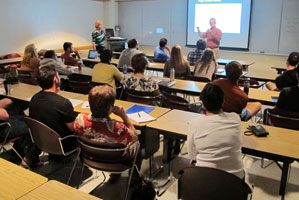Report: Student veterans study harder but are less engaged in campus life
According to a new report from the American Council on Education in collaboration with the National Survey of Student Engagement, student veterans/service members are more likely to be the first in their family to attend college, are older and are more selective about their campus life and academic activities. Their life responsibilities outside the classroom can put restraints on their time, and despite efforts by colleges and universities, they report feeling slightly less supported on campus than nonveteran/civilian students.
The report, "Student Veterans/Service Members' Engagement in College and University Life and Education," uses data from the 2012 National Survey of Student Engagement to compare responses from a group of veterans/service members to those of nonveteran/civilian students. It follows up on ACE's previous research into the on-campus services offered to student veterans in the July 2012 "From Soldier to Student II" report.
The National Survey of Student Engagement is based in the Indiana University Center for Postsecondary Research, part of the IU School of Education.
"Helping veterans and members of our armed forces achieve their educational goals has been part of ACE's mission since its founding in 1918," ACE President Molly Corbett Broad said. "Nearly three-quarters of a million veterans have used their post-9/11 GI Bill benefits to attend college, and this closer look at who they are and what they're looking for will help our campuses in their ongoing efforts to serve them more effectively."
Among the report's findings:
- Sixty-two percent of student veterans/service members indicated they are the first in their family to attend college, versus 43 percent of nonveteran/civilian students.
- The average age of student veterans/service members enrolled in four-year universities is 33, compared with nonveteran/civilian students, whose average age is 22.
- Student veterans/service members report spending more time working off-campus for pay, providing dependent care and commuting to campus than nonveteran/civilian students.
When asked whether institutions are providing them academic support, 72 percent of student veterans/service members indicated their institutions provided them that support very often or often, versus 77 percent of nonveteran/civilian students. Meanwhile:
- Student veterans/service members were more likely (70 percent) than nonveteran/civilian students (65 percent) to spend at least 10 hours per week preparing for class.
- Sixty-one percent of student veterans/service members said they have a positive relationship with faculty members versus 54 percent of nonveteran and civilian students.
- Similarly, 46 percent of student veterans/service members said they feel supported by and have a sense of belonging with administrative personnel, versus 36 percent of nonveteran/civilian students.
- But student veterans/service members also were less likely to work with faculty on activities other than coursework (18 percent of student veterans/service members versus 23 percent of nonveteran/civilian students) or collaborate with classmates outside class to prepare assignments (49 percent of student veterans/service members versus 57 percent of nonveteran/civilian students).
"After 'From Soldier to Student II,' in which we documented how colleges and universities were taking action to serve veterans and members of the armed forces, we wanted to know how they were faring," said Young Kim, the report's co-author. "The National Survey of Student Engagement gave us some powerful insights into how veterans act on campus, and where college and universities can do more."
"Combining resources with the American Council on Education allowed us to analyze data and produce this report, which we think provides important information in the on-going discussion regarding student veteran success in higher education," said James Cole, research analyst at NSSE and the report's co-author.
The report also compares student veterans/service members to nonveteran/civilian students over the age of 25. It is available for free on ACE's website, along with the council's past and ongoing efforts on the subject. Colleges and universities interested in further developing their on-campus services for this population may also want to visit ACE's Toolkit for Veteran-Friendly Institutions.
About ACE
Founded in 1918, the American Council on Education is the major coordinating body for all the nation's higher education institutions, representing more than 1,600 college and university presidents, and more than 200 related associations, nationwide. It provides leadership on key higher education issues and influences public policy through advocacy. For more information, follow ACE on Twitter @ACEducation.
About NSSE
The National Survey of Student Engagement conducts an annual survey, launched in 2000 and updated in 2013, which assesses the extent to which students engage in educational practices associated with high levels of learning and development. The questionnaire collects information in five categories: participation in dozens of educationally purposeful activities; institutional requirements and the challenging nature of coursework; perceptions of the college environment; estimates of educational and personal growth since starting college; and background and demographic information. In 2013, 621 colleges and universities participated in NSSE; 1,554 have participated since 2000.

